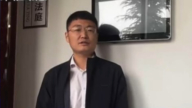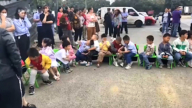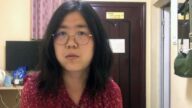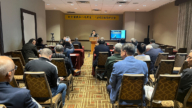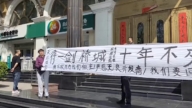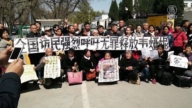【新唐人2013年05月28日讯】中共喉舌媒体近期发表一篇题为《底层上升通道受阻,一代穷世代穷》的文章,引发大陆十万网民的讨论。文章强调中国底层无法上升,社会阶层固化加剧的主要原因是城乡教育不均衡,但这个结论遭到网民的反驳。而社会问题专家指出,中共特权制度和权贵世袭制,才是造成阶级分化的主要原因。
《人民日报》提出,因为大陆城乡教育资源的不均衡,和竞争不公平,导致大量农村学子放弃高考,造成了底层向上的通道越来越窄,社会阶层固化趋势加剧,贫穷将会代际传递,一代穷,世代穷。
但一位网民说:“一代红,后代红,一代有权,世代有权,它们利用这些权力阻止穷人享受,才是根本原因。”
时事评论员林子旭:“现在中国底层民众的贫穷,城市、农村都差不多。中国社会现在非常的不平等,绝大部分社会资源都被控制在中共官员手里,这些人的亲朋好友几乎抢占了中国社会的所有机会,普通百姓家的孩子拿什么和这些人争啊?要说底层上升通道受阻,那最大的障碍不是别的,恰恰就是中共权贵阶层。”
时事评论员林子旭还指出,现在大陆底层的民众不仅仅是很难找到发迹的机会,就连最基本的“生存权”都很难保障。举例说﹕中共官员和太子党们都吃“特供”,而老百姓餐桌上却是各种“毒食品”,底层民众连健康和身体素质都和权贵们拉开了差距,社会底层家庭的孩子就更难翻身了。
另外,《法国国际广播电台》在《中国特权制度亟待改革》文章中也指出,特权阶层大量消耗甚至浪费着最大量的公共资源,使得社会政策的确立越来越困难。世界上没有一个国家像中国一样,有那么多人争当公务员,因为这个群体在众多领域享受着无穷的好处,而“高干群体”更是无需通过市场交易来维持生活,对他们来说,国库就是私人银行。
外界评论中共内政的三种手段,包括﹕维稳、世袭、搞特权。评论说,如果中共特权造成了资源和贫富的两级分化,那么特权的世袭,则彻底的堵死了中国百姓上升的通道。
香港《苹果日报》指出,中共权力世袭有三大特点:
第一是﹕“舆论护航”,中共组织部和宣传部,负有使“红二代”们免受舆论轰炸的任务。
第二是﹕“官商通道畅通”,而普通大学生要想加入公务员,却好像和千军万马争独木桥。
第三是﹕不同代领导人的子女,世袭的分级清晰,隐隐排成接班梯队。如中共第二代领导人邓小平、陈云等,子女担任国家领导人。第三代的江泽民、李鹏等子女担任省部长,如山西省长李小鹏﹔而第四代的胡锦涛、吴邦国等子女担任司、局长。
《苹果》认为,以上三大特点显示了中共的权力世袭潮,不是个别领导人的个人行为,而是有共识、有计划的集体行动。
旅美中国社会问题研究人士张健:“如果他不搞世袭制,有可能他就会相信,因为没有这种血缘关系,这个政权就会彻底的瓦解。所以,共产党会把各个利益集团都强加在一起,拧成一股绳。在这种情况下,共产党还会认为他们有一定的安全性、有一定的可保证性。”
《法广》的文章指出,中国特权制度最终不得不改革,如果晚改,有可能导致财政和政治的双重危机,甚至失去改革的危机,而演变成革命。
采访/常春 编辑/张天宇 后制/李若琳
Hereditary privileges in China, Grassroots have no chance be highly promoted
An official commentary regarding the passing-on
of poverty that exists among the grassroots in China
has sparked a heated debate involving
100,000 Chinese netizens.
The article alleges that the main cause
of the grassroots’ lack of promotion opportunities
and the widened social stratification
is unbalanced education in cities and rural areas.
The view has been widely refuted by netizens.
Experts on social issues indicate that China’s
social stratification is mainly caused by the privilege system
and the hereditary power succession system
of the Chinese Communist Party (CCP).
The CCP mouthpiece, the People’s Daily, suggests
that there exist unbalanced educational resources in China’s cities and rural areas.
This, along with unfair competition, has caused
great numbers of rural students to give up on their college entrance examinations.
As a result, these have reduced chances for the grassroots’
promotion, and widened social stratification.
The article says that rural residents will remain in poverty
which will be passed down to their future generations because of this.
In contrast, a netizen posted, “A revolutionary father
can make his future generations all enjoy privileges.
They used these powers to block the poor from
enjoying their rights, which is the root cause.”
(Critic) Lin Zixu: “Currently, the poverty of the grassroots
in cities and in rural areas is almost the same.
Inequality can be seen everywhere in China.
The CCP officials have controlled the vast majority
of the social resources.
Their relatives and friends have grappled
nearly all opportunities in China.
How can ordinary people’s children compete with them?
Speaking of the blocked promotion opportunities,
the biggest obstacle is the CCP privileged group.”
Lin Zixu indicates that by now, the grassroots in China
have hardly safeguarded their basic rights of subsistence.
For example, the CCP officials and princelings
have all enjoyed custom-made food.
In contrast, the civilians eat contaminated food daily.
That’s a widening gap in health and physical fitness
between the grassroots and the privileged group, let alone the personal growth chance for the rural children.
Radio France Internationale (RFI) commented
on China’s privilege system.
It said that the privileged classes have vastly consumed
and wasted the maximum amount of public resources.
This has made it more difficult to establish social policies.
No country in the world like China has so many
people to compete for a civil service position.
This is because civil servants in China can gain numerous
benefits, whilst the group of CCP high-ranking officials
can enjoy their happy lives by getting money from
the state treasury, their private bank.
Media have commented on the CCP’s three approaches
taken in its governance—stability preservation, nepotistic rule, and enjoying privileges.
According to the comments, the CCP officials’ privileges
have polarized the rich and poor.
Their hereditary privilege succession has completely blocked
opportunities for the grassroots to develop in society.
Hong Kong’s Apple Daily have said that the CCP’s
hereditary power succession has three features.
The first is being protected from public criticism;
the CCP Central Organization Department and
Propaganda Department have duties to protect
the CCP princelings from public criticism.
The second is that they are given smooth paths
to become officials and doing business;
In contrast, ordinary college students have to get through
extremely fierce competition to obtain a civil service job.
The third is that there is a clear caste system of hereditary
power succession for example, Deng Xiaoping and Chen Yun
were the 2nd generation of CCP leaders.
Their children have been appointed state leaders.
Jiang Zemin and Li Peng were the 3rd generation,
their children have taken posts at the provincial level.
Li Xiaopeng, Li Peng’s son, is governor of Shanxi province.
The 4th generation covers Hu Jintao, Wu Bangguo,
and other CCP leaders.
Their children have served as sub-ministry department chiefs
and department directors.
Apple Daily stated that the three features show
the CCP’s hereditary power succession is not
some specific leaders’ individual acts,
rather, it is a planned collective action under consensus.
US-based researcher specializing in China issues, Zhang Jian:
“The CCP views this hereditary system as a kind of kinship.
It believes that without it, its rule will end.
So the CCP has stuck all interest groups (together),
and twisted them into a rope, to increase security.”
RFI says that a reform on China’s privilege system
will eventually be carried out.
If it occurs late, it may lead to financial and political crises,
and even evolve into a revolution.


